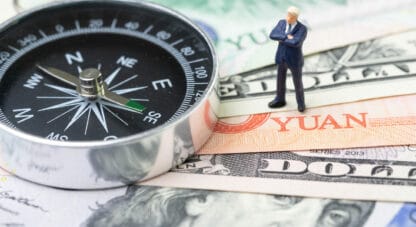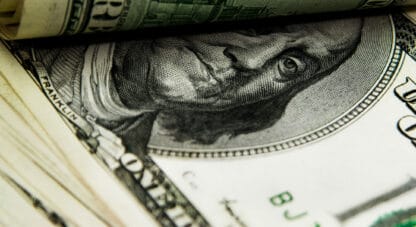About this week’s show:
- Interest rates reach 5,000 year lows
- Post Brexit: Is Italy now the deciding blow for EU Project?
- Liquidity Watch: A 6 lane highway IN could turn into a goat trail OUT
The McAlvany Weekly Commentary
with David McAlvany and Kevin Orrick
“If you already own gold, my suggestion is hold fast, add on dips. $1307 was decisively broken. Remember this – global fundamentals are in your favor. So, as they say when you’re getting into the roller coaster, keep your hands and feet in the car. Roller coasters are fun, but they’re really only fun once you are reflecting on the experience on them in retrospect.”
– David McAlvany
Kevin: Returning again, now from Orange County, Dave, you had a chance to take your daughter, for the first time, on a conference, but she also got a roller coaster ride at Disneyland.
David: That’s right. It’s funny, she’s very enthusiastic about adventures with Dad, and because it was her first business trip, I did want it to be extra fun. So we layered in a few more adventures and things along with our regular work schedule, just so that she has solid memories of that first experience. Five years old, and I thought she did great, can’t wait to travel with her again. That was a lot of fun.
Kevin: We had an amazing time, again, with our clients and listeners to the show. I would just encourage anyone listening to the show, if you find out that we’re doing a conference, getting together with clients and listeners in your area, make sure you try to come, because it’s a real community of very, very knowledgeable people.
While we were gone, Dave, I didn’t keep up with the news too much, but I noticed that the supreme commander, Ben Bernanke, who of course, is now retired, but still having major influence on central banks around the world, had a trip to Japan to show them how to print more money.
David: That’s right. He was meeting with Kuroda, he was meeting with Mr. Abe. Of course, Mr. Abe had an upper house election victory this weekend which set in motion more discussions of stimulus, more discussions of coming to the aid of the consumer and creating incentives for spending.
Kevin: They were printing two trillion more Japanese yen, I think, is what they were going for.
David: Correct. When you look at last Friday, and then early this week, and watching the ebullience in the stock markets around the worlds, we have Mario Draghi continuing to promise the sun, moon and stars. We have Ben Bernanke on his rock star tour – “I can teach you how to do it and get the job done.” And of course, you have Abe and Kuroda collaborating on how they can spend more money from their printing presses. And of course, the stock markets love that. It’s like asking a junkie if he wants a little bit more extra smack. There’s yes, yes, yes, all the way around.
Kevin: For those who are not addicted – the paper markets are just an addicted market, it’s like you said, it’s like a junkie taking a hit – but for those who have stayed away from the addiction, they’re going for the unprintable currency. One thing Ben Bernanke cannot help Japan with is how to print more gold.
David: It’s one of the things we mentioned, I think, February or March of this year was that home safes in Japan were selling at a record rate. One of the reasons they were doing that is because people wanted to, in light of negative rates, have actual yen on hand. And as it turns out, the Japanese investor today is looking also for the unprintable currency. Gold retailers have seen a very significant increase in volumes. This has been even in the context of the yen rising since Brexit, and volumes of gold at the retail level have been just through the roof.
Kevin: It’s not just Japan right now that is promising more easy money. You mentioned Brexit. Britain is looking at dropping interest rates again.
David: They estimate about a 78% chance of a decline in rates. This would be the first decline in interest rates for the Bank of England, going back to 2009 when they moved to 50 basis points, where they currently are. Of course, the average of one central bank rate cut every three days on a global basis continues. If you think about that, that is a remarkable amount of accommodation. It was Jim Grant who, in a recent report, suggested, interests are at 5,000-year lows, and he asked the question, “Does that suggest that the global economy hasn’t been in this weak of a condition since 3,000 B.C.”
Kevin: At the briefing that you gave in Orange County this weekend, you showed an amazing chart showing negative interest rates and interest rates being as low as they have ever been in thousands of years. People really don’t understand the full ramification of that, Dave. We’ve seen negative interest rates in isolated countries before. We’ve never seen to the degree – almost 12 trillion dollars right now negative worldwide.
David: I’m working through a paper right now by Richard Koo. It’s the other half of Macroeconomics and Three Stages of Economic Development, a paper that he presented back in May at the World Economics Association Conference. A fascinating piece, because as you might recall, in 2001 he wrote his book, Balance Sheet Recession, a very important book, in which he anticipated what the central banks have been experiencing – frustration, in point of fact – frustration with monetary policy that doesn’t seem to be gaining traction.
Why, with all the stimulus that has been put into the economy, aren’t they reaching their inflation target numbers? He goes into detail in this paper, as an extension of his book, Balance Sheet Recession, and says, “What we’ve always assumed in macro-economics is that if you lower rates, there will always be an ample appetite for borrowing.” But he is saying that is not the case. There are points at which people have so much debt that they prefer to get rid of their debt, and it doesn’t matter how low rates go.
He says, “This is a bias which is embedded in the study of macroeconomics because all of the studies, all of the models for the last 60 years have assumed that low rates equal an increase in borrowing because it’s just obvious, people will borrow with cheap money. He makes the case, “No, no, no, that’s not the case.” And in some instances businesses will say, “It’s not worth adding leverage to our balance sheet because we fear not being able to make back principle and interest payments.”
In the case of households, the same equation, where there is an existential threat with the idea of having more debt, the insolvency threat is greater than any perceived benefit of cheap money, and frankly, if there are no real opportunities to invest in to make those borrowed funds seem productive, then it’s just avoided altogether.
Kevin: That takes me to the topic of corporate earnings. This weekend we met with one of our clients who had owned fast food restaurants when he was in that business. You could tell he managed for efficiency. He talked about some of the efficiency things that he did, but what was the bottom line that he was looking for? Corporate earnings. If you are running a business – let’s say, Dave, the businesses that you run, or even in the case of this gentleman who owned fast food restaurants, if his earnings are down he is not likely to go borrow money to expand. He’s probably going to cut costs and figure out how to reduce the bottom line. Corporate earnings were peaking out – we talked about it – about 24 months ago, were they not?
David: I’m going to suggest a sort of perverse incentive, which exists in publicly traded companies that doesn’t exist in privately held business. Publicly traded companies that have executives that have been entrusted with the management of those businesses have compensation packages which are tied to improved earnings-per-share.
Kevin: Earnings-per-share – that’s where the buy-backs come in to increase the earnings-per-share.
David: That’s exactly right, so it is possible to borrow money, not for any real productive use, but simply to retire shares, with the incentive being, and I describe it as perverse because that is exactly what it is.
Kevin: Sure, you’re reducing the amount of shares on the market and increasing whatever earnings are there per share.
David: And there is no accountability for those executives who are doing it for the purpose of getting a larger bonus, themselves, for the few short years that they stay as an executive at that company. And note that as this perverse incentive has existed, the turnover rate of the average executive has also increased, so they have no intention of staying there long enough to care about the future of the business, which again, is in stark contrast to a privately held firm which would say, “No, I’m not going to go into debt to do something foolish, I’m just not going to go into debt today.”
The fact that corporate America is leveraging up at this point, again, it has to do with what Andrew Smithers suggested several years ago on the Commentary. We’ve got remuneration packages which are incentivizing terrible behavior. So yes, there is an issue with corporate earnings. We could see a domino effect circling back around to the U.K. The effect of a U.K. recession – look at what that does to Europe, which I think would be significant.
If you look at Europe and the U.K. as being weak to begin with – let me give you an example – current account deficit in the U.K. is currently 5.2%. That’s the worst it has been in any year going back to 1948 when the records were kept. And by the way, it has been in decline for the last four or five years, so what Brexit represents is not this random act of popular insanity, it is a reaction to a stagnating, declining economy. All that to say, you have the equivalent of a compromised immune system in the U.K. and in Europe, and so for the U.K. to be tipping into recession, and Europe to really be struggling at the edge of recession already, a very small event can have a very big impact if you’re talking about having a compromised immune system.
The S&P 500 companies here in the United States get 40% of their earnings from overseas with a very large part of that coming from Europe. There is a very real risk to U.S. companies, and further pressure coming on U.S. corporate earnings, if their earnings and profit margins suffer as a result of what is happening in Europe and the U.K.
There was a point that I made in our recent presentations, and it was that weakness has already showed up in emerging market equities, and it has already showed up in the developed markets if you are looking at Europe, and Asia particularly. The U.S. has stood out as a bastion, that is, the U.S. stock market, the S&P and the Dow. One way of interpreting that is that the U.S. equities market has been rotated into as riskier geographies have been taken out of portfolios, and again, that leaves us with the last one to be rotated into.
Kevin: You brought up a compromised immune system and this is so important. I remember taking two flights as we flew out to California. I was on a different plane. And unfortunately, on both flights, I sat next to somebody who was sneezing and coughing, sneezing and coughing, and a lot of times on these trips we don’t get much sleep. So when I got there I thought, “I’ve got to make sure that I get enough sleep because once you have one thing happen, then another, then another, you can really get knocked down pretty quickly. I feel great at this point, but that’s the same challenge that older people face. A lot of times it’s not the cold that gets them, it’s the thing that happens right after the cold, or the thing that happens right after the fall. And so we talk about these things, Dave, and we say, “Is this the one thing – like Brexit – is this the one thing that will bring the system down? No, but the system is compromised. It’s weak. And debt is creating a compromise to the point where, really, the only market right now, the equity market that has survived this thing without downturn, is the U.S. market.
David: Which leads me to one final conclusion on that, which is, we’ve been rotated into, on the basis of other risks being less appealing and we can just as easily be rotated out of as risk is continually examined and re-examined. So, the other side of that argument is that right now we have earnings expectations for the second half of the year which are quite high. And add to that the business news media sort of hyping this idea that we’re going to see as much as a 15% expansion economically in 2017.
That’s all well and good, but you look and you say, “GDP is not rising, or it’s slow to rise, and we have wages which are not moving in a robust fashion, so how do you increase earnings? How do you see a massive increase in earnings, say, 15% next year, if in fact, GDP is moving at a 1% rate, or 1.5% rate. Obama has averaged 1.55% rate while he has been in office in terms of an increase to GDP.
Kevin: Why would we assume that we’re going to have a rise when we’re seeing Spain, Italy, Germany, China, Japan – all of these other markets are down – why would we assume that we’re just going to have an increase?
David: But what is being said is the expectation of an increase in earnings in the second half of this year which will carry over into strength in 2017, a 15% expansion of earnings in 2017, and it’s not based on reality – it’s really not. So I favor the former view, which is that we are the last equity rotation, and we will fall in line with our global equity peers, so you have Italy and Spain which are off 30-35%, you have Germany that is down 25%, you have China which is down 40%, you have Japan which is down 25%. And in a global economy it is difficult to see why our equity markets here in the U.S. would be any different. We may be in a different part of the food chain, but we’re still in the food chain.
Kevin: Now that we’re finished with Brexit, I got my Economist magazine, and it’s got a picture of a bus with an Italian flag painted on it, and it is literally falling off of a cliff. So, we’ve been focused on Greece, mainly, until the British exit. Now Italy, which is a much larger problem, I guess it will be the next series of commentaries, Dave.
David: It is the weak link, and you’re already seeing some of the folks in Europe and Brussels say, “Look, now, this is not something that is an acute crisis at all, not really something we have to worry about at all.” That’s straight from Dijsselbloem in Brussels. I think what they don’t want people to pay attention to is just how weak that link is. Greece has been the weak link, but it’s not on the same scale. It’s not on a big enough scale to derail the European project. When you look at Italy, on the other hand, you have sovereign debt which totals 135% of GDP, comes in at roughly three trillion dollars, and of course that number is ever on the rise as our debt levels are, and just about every sovereign on the planet.
Kevin: You know what is strange – look at the danger in Italy, yet their yield is lower than a U.S. yield. You would think that the yield on a bond in Italy would be much, much higher than the United States because the potential of default is higher.
David: And remember it was Rogoff and Reinhart who both argued that if sovereign debt levels exceed 90% of debt-to-GDP, which clearly Italy does at 135, that you have moved into a period of instability. And financial crisis, statistically, moves from possibility to high probability. So yes, you have the ten-year treasury there at 1.19%, still positive, which is almost an anomaly in Europe anymore, but compare that to the U.S. ten-year treasury, at about 1.39%. By the way, last week we got to a record low. We saw those lows set in 2012, we have returned to them at about 1.31%. Just think about this. In and of itself, this speaks to the unnatural pricing of assets in the fixed income arena. How does Italy have their ten-year paper priced more cheaply than ours? They can borrow in the market more cheaply than we can. Obviously, there is a 90-billion dollar footprint in the marketplace, which is the ECB, and the ECB has manipulated prices in the fixed income markets where prices are higher, yields are lower, so that is a part of the issue.
Kevin: Don’t you think part of it, though, Dave, is that we no longer look at default as a potential. Let’s look at the financial crisis back in 2007-2008. Bank loans here in the United States were estimated to be about 5% bad loans. There was a risk of default, and guess what happened? The guys rode in on their horses, they printed money, quantitative easing, lowered rates, what have you. People have been deconditioned from default. They don’t even accept that as a possibility.
David: That is why, last week, Puerto Rico’s default on general obligations bonds came as a shock to the market. Why? Because they’re GOs. You never have problems with those. Revenue bonds, of course, because the source of revenues can dry up, and so there is a higher risk with those, but general obligation bonds should never be at default. And yet they did go into default last week. Payments were missed.
And you are right, coming back around to Italy, a Wall Street Journal article last week reported that 17% of all bank loans in Italy are bad. And you just brought to mind the 5% number which we had at the very worst of the global financial crisis circa 2008-2009 the bank crisis here in the United States we had 5% bad loans. You have a multiple of that – three times multiple of that – in Italy. Bear in mind the nature of banking all over the world. We’re dealing with a fractional reserve banking system where 17% of bad loans means that these institutions have been insolvent for some time and are literal zombie institutions. So for Jeroen Dijsselbloem, the European President, to be saying, “We’re not concerned about Italy, it’s not an acute crisis,” I think this goes back to what one of his colleagues said. Was it Juncker who said a few years ago, “If the situation gets really bad you have to lie?” Because that is just unmitigated balderdash. And you’re right, this last week’s Economist had that picture of the bus teetering on the edge of the cliff, painted like the Italian flag.
Kevin: Let me ask you. We keep focusing on Britain right now, but we used a chess board analogy the other day and could Italy be the queen that the bishop Brexit was protecting? So now the bishop is out of the way, we lose the queen, and could that actually affect or take down the entire euro project?
David: The challenge for Brussels, and for the Eurocrats in Brussels, is that Italy, in a post Brexit world, can threaten the demise of the entire EU project if they don’t get the relief they want. Perhaps they don’t act on the threats that they put out there, but they’ve just acquired a huge amount of leverage. Because Britain represents sort of the first olive out of the jar, now you have a very integrated economy into Europe, with big debt issues, and it’s far larger than Greece was in terms of making a contribution to the Eurozone economy.
And now, will they enforce greater austerity, or will they attempt to solve this by passing on the obligations to taxpayers? And of course, the ECB is saying, “It’s not within your rights to do this. You can’t do this.” Renzi and others are saying, “We’ll do what we have to do. We have a banking crisis and we don’t want to see the entire industry collapse.
Kevin: And the ratings, Dave, we’ve always called into question Standard & Poor’s and Fitch, and Moody, these guys who possibly are paid off to keep things high, but even they have had to yield, they have had to succumb over this last year and continue to lower the ratings of these sovereigns that are in this European project.
David: That’s an interesting issue because most investors today who are saying, “The Dow is at new highs, the S&P is at new highs. You know that the central banks are going to be supportive. There is nothing, really, here to worry about because the Fed has your back, the BOJ has your back, the Bank of England has your back, the ECB has your back.” Since the beginning of the year we have had 16 sovereigns separately down-graded by S&P, 16 sovereigns also downgraded by Fitch, which is more than in any year in history other than 2009.
I generally want to be sanguine. I do. But there is reason to be concerned when the trend is that negative. If you want to put your head in the sand like the proverbial ostrich, that is fine, the Wall Street Journal headline reads this week, “S&P near record highs, treasury yield at lows – something’s gotta give.” And they’re right, something does have to give. We’re at inflection points. We’re at very significant inflection points in the marketplace, and just like 2007 – remember this – just like in 2007 you had economic fundamentals deteriorating even while prices were on the rise. And people were ignoring the fundamentals because they were more than happy to look at their account balances and see them improving. And they literally ignored what should have been a siren saying, “Something is wrong.”
Kevin: It hit us on Sunday, Dave, when we were sitting down with one of our long-term clients, a brilliant guy. He has managed his triangle very well through the years, but as we were talking, we were talking about these different numbers that are signaling transition or inflection point. When you said inflection, it reminded me. We said, “If we were having this consultation in 1999, right before the tech stock crash, we would have seen numbers like this. If we would have had this consultation in 2008, right before the crash, we would have seen these numbers where they’re not making sense.”
Now we’re having that conversation in 2016. You pointed out over and over in your presentation through charts and through just good reason that 2016-2017 is a major inflection point. We’re talking about a weakened immune system, a compromised immune system. One of the key elements, other than corporate earnings that goes into economy, of course, is employment. Yellen focuses on what it is that she likes to focus on that will make popular opinion work her direction, but what she focused on in 2014, you brought this out two weeks ago, was the LMCI. That is their own personal way of looking at employment, I believe. Now it’s not showing her numbers that are helpful.
David: It’s an index of 19 different factors that get averaged into a number at Labor Markets Conditions Index, and it has not been cooperating of late. You had the June number, which is just out, and it is the sixth month in a row that it has been in decline. They were expecting a negative 1.2, so they did anticipate a lower number, but it ended up being negative 1.9. So, you have that in stark contrast to the June jobs numbers, the nonfarm payrolls, which was “stellar.” And so, at some point, what you will see the Fed do – you remember when M3 became very inconvenient because it was communicating something that they didn’t really need communicating?
Kevin: Right. So, we don’t communicate it any more.
David: No, they just got rid of it. So, will the LMCI number be M3ed, as it were? Because you’ve now got six months, and as we have presented in both Orange County and in Seattle, generally speaking, the LMCI turns down three to six months before an official recession is announced, and we’re already six months in. Maybe it’s three or four months longer before we have a recession declared, but the idea that somehow we’re going to have a stronger second half and 2017 is going to be stellar, and the employment number for June came in at a whopping 287, with 180,000 to 200,000 expected…
Kevin: Of course it’s better. We’ve got the election fix in. Our friend, Bill King, says that you’re going to see this all the way through the election.
David: We have four employment reports before the election, and yes, maybe he’s right, maybe we’ve transitioned to, when they report those numbers, which happens to be Fridays, maybe we could just call them Funny Fridays from now on, from now until the end of the year. The number which was reported is disconnected from reality. The birth/death model, as we’ve discussed, adds, on average, about 200,000 jobs a month. You have the May and June seasonal adjustments, which are particularly whacky because you have school closing dates which are not consistent.
You had May’s number, which, as you may recall, was an abysmal 38,000. It was revised lower to 11,000, which puts your two-month average, May and June, near 150,000. You look at that and you say, “Let’s just stop the negativity and claim that we have 150,000. It still stands in stark contrast to the LMCI, which as recently as 2014 Yellen said is a far more reliable metric for labor than the U3 or U6 metrics which the general public is so fond of referring to, in terms of being near full employment and having seen a full recovery in employment.
Kevin: We talk about unemployment and these types of things and hopefully our listeners aren’t thinking that these are just dry economic ideas. We have talked about Spain before – the high unemployment of people under 30 years old in Spain, and how that leads to social unrest. Unfortunately, it was very sad this weekend, but social unrest is really reaching a high here in America. It’s a long, hot summer. But I’m wondering if some of that has to do with unemployment.
David: It was Bill King, maybe six months ago, who said, “I’m beginning to sense something like what we had in 1968.” And if you go back to 1968, there was a tremendous amount of social volatility. You had mass riots in France, tremendous amount of violence.
Kevin: We had assassinations here in America, Bobby Kennedy, Martin Luther King.
David: From a standpoint of philosophy and literary criticism, a lot of the work that was being done in 1968-1969 opened up the door for the post-modern platform that we understand today, or is taught in many schools, but again, it was just a period of intense volatility. We had a flashpoint this last week in Dallas as a reaction to issues across the country with police violence, but know what the context is. What is the context? There is a context and that is, the jobless rate for black male teens in January was at about 22%, so not far off what we saw in Spain in terms of a youth unemployment rate.
But June’s seasonally adjusted numbers came in just a wee bit higher. They are now registering at closer to 40%.
Kevin: 40%. From 22 to 40 in just a matter of months.
David: Is it safe to assume that we’ll see continuation, a proliferation of riots and violence? I know that when I was in high school, having time on my hands was a bad idea, and anyone, particularly in the age group of 14-21 – that’s a bad time to have lots of time on your hands. So, in my opinion, all lives matter. Yes, black lives matter, but all lives matter, and I just can’t see that bad actions on the part of a few policemen do justify bad actions on the part of protestors. That’s a problem. Indiscriminate shooting and violence against whites, specifically because they are white – I think that would go back to that category of judging someone according to the color of their skin. If we learned anything from Martin Luther King, if there was any truth to what either a Bishop Tutu or a Nelson Mandela may have said about race relations, and it may even be a stretch here to assume that Jesse Jackson would also be loathe to demand reverse racism as an answer to unjust and criminal treatment by law enforcement, but this is a real issue. We cannot allow for reverse racism, any more than we can allow for an unjust system that would allow for men to be killed unjustly.
Kevin: Because of their color.
David: But the solution to the problem, while it may be protest, is not violence. It’s not violence. It never has been. It shouldn’t be. And at this point, if you’re trying to justify those kinds of behaviors, you’re going to have to lean pretty heavily on somebody like a Joseph Fletcher, who popularized the notion of situational ethics. So what does this spell? We had major riots in Berlin over the weekend – 3500 people. You have burned-out cars. It’s not just here in the United States.
But I will tell you, whatever the flashpoint is, whatever the obvious catalyst is, there is a backdrop issue, and the backdrop issue is the same issue that is propelling populism in almost every country around the world. We have a very weak economy, globally, and to pretend otherwise is going to surprise the elites in a massive way. It should be no surprise at all to see violence, it should be no surprise to see riots, it should be no surprise to see social unrest as an indication of things boiling over. But again, the jobless rate for black male teens, going from 22-40%, is that relevant? It is relevant. But I’m telling you, it’s an issue in Paris, it’s an issue in Berlin, it’s an issue in London, it’s an issue in many of your capitals around the world.
Kevin: Just looking at social unrest, there is social unrest, there is political unrest, and then there is geostrategic unrest. We talked, a couple of weeks ago, about the Scarborough Shoal, and whether China would recognize international law coming out of the United Nations. We’re starting to get that answer now.
David: In my presentation in the last few weeks, I contrasted the difference between hot and cold conflicts, and areas where we expected to see change. The issue with the Scarborough Shoal and the Hague making a ruling on that claim – this is a maritime disagreement between the Philippines and the Chinese – and what I said was that the claim of sovereignty over this territory, if the Hague ruled against the Chinese, would mark a significant shift in the Chinese attitude that they would automatically reject the legitimacy of international law, and that they would reassert their claim to the shoal consistent with what they have said all along on their nine-dash line, and that from that point forward they would be much more aggressive, and that we would face a greater probability of military conflict, or their Asian neighbors face a greater probability of conflict with the Chinese militarily.
Kevin: And now they’ve thrown down. They’ve basically said, “No, we don’t really recognize that.”
David: That’s exactly right. This week The Hague ruled in favor of the Philippines, and this, I think is a milestone. It’s a milestone ruling for a transition to a more assertive and militarily forceful China, and it does, as I say, represent a hot conflict. Again, that relates to The Hague ruling this week.
Kevin: Dave, there is a general sense, on all sides, that we’ve been lied to. People are getting ready to reach a flashpoint much quicker. You have the liberals, you have the conservatives, you have the libertarians, you have the Trump people, you have the Bernie Sanders people. I can’t really bring Hillary in that because she’s definitely non-GAAP as far as non-generally accepted accounting practices.
David: (laughs)
Kevin: We saw this last week with the FBI. But people are looking at this, saying, “You’re kidding me. So, she was just a little bit careless with her emails?” Dave, just shifting gears here just for a second as far as not being told the truth and non-generally accepted accounting practices being the way we should accept our numbers. I have a client who was with us in Orange County who worked for a defense contractor. He had very high-level Top Secret clearance when he was active. He told me, “Lives will be lost because of the information that was leaked through Hilary’s carelessness.”
Just like with Edward Snowden, there were people who were revealed, there are people who were very, very deeply embedded in the secret world who really rely on secrecy for their life to be retained so that they can continue to either do business with America, or actually work toward the security of America. Those lives will be lost. But what is happening is, people are standing up against that at this point.
David: In the area of economics, we’re coming into the second quarter of earnings. That started this week. We had Alcoa, and it’s the same principle. What you’re being told is not necessarily what you need to know as an investor. But what you’re being told is no surprise. Alcoa beat their earnings-per-share expectations by a country mile. They were using creative accounting techniques.
Kevin: Hokey-pokey accounting, yes.
David: So, revenue, if you’re looking at that number, is down 10%. But that’s of no concern. Who cares about sales, who cares about revenue, as long the earnings-per-share number is a beat? Now, how did they beat their earnings-per-share number so handily? Well, of course, that’s non-GAAP accounting. That’s the basis of it – non-GAAP accounting. We’ve harped on this before, but IBM is still treated like a hero for their earnings-per-share improvements, even as revenues have fallen off a cliff over the last decade. It doesn’t matter, as long as earnings-per-share is positive, no one seems to care.
Kevin: And they do that by shrinking the amount of shares outstanding.
David: Yes, shrink the outstanding shares. In the case of IBM they’ve gone from 1.6 billion shares to around – I forget – around 930 or 960 million shares. But that is how the company treasury uses these gimmicks to pretty up the pig. We have the second quarter earnings. They are expected to be lower by 4.7%, but again, it is as if the news media is trying to create this conditioned approach of, “Well, yes, it’s going to be worse by 4.7%. Yes, we are registering a fourth straight quarter of negative earnings. But this is the turn, we’re going to have a positive second half, 2017 is going to be great.”
And again, can you let that register? Sink in? This is the fourth straight quarter of negative earnings. Earnings are off peak by 31%. Sales continue to decline. Inventories continue to increase. You have deteriorating fundamentals, even as you have increasing stock prices, and that is curiously like 2007, of course, just before we had the market sell-off in 2008 and 2009. How does the new media get away with pumping up the importance of the earnings-per-share victories?
Because again, you have earnings which are in a secular decline. You have the profit cycle, which is already turned down. This is one of the charts that I showed in our presentation – sales and inventories continuing to move in the wrong direction. And yet, investors are satisfied knowing that promised stimulus from central banks will allow for market participants to continue to succeed. And what do they do? They are willing to turn a blind eye to domestic weakness. They are willing to turn a blind eye to global economic weakness. And it reminds us that black swan events are only black swan events for the willfully ignorant, people who prefer blindness, as long as it makes them feel better.
I am reminded of the guy in The Matrix – I think his name was Cipher. He has had enough of the struggle. He wants to take the façade of reality and have that become his reality. He wants to be plugged back into the matrix. So he is meeting with agent Smith – you might remember this from the movie – and agent Smith has already plugged him back into the matrix, so he’s not actually eating a steak, but this digital reality allows him to take a bite, and there is the stimulation to his brain of the juicy flesh of this filet mignon.
Kevin: And even though it’s not real, he loves the taste, and he loves being back.
David: And he’s chewing on it, and he just says, “Oh, ignorance is bliss.” And that’s the context that we’re in. I guess all this to say that there is a lot of hype, there is a lot hope, which has been put in the idea that the second half of 2016 is going to be considerably better than the first half. We have equities trading at new highs. What are they positioned for? You have to remember this. Summer rallies, in the context of economic weakening typically makes for a disastrous autumn, makes for a disastrous Q3 and Q4.
Kevin: Horrible Octobers.
David: This autumn could be an absolute nightmare for stock investors, and yet there are going to be proclamations from Bloomberg and CNBC that this is a surprise, we just can’t believe it. There is this particular event, or that particular event which are to blame. And what they’ve ignored is the long and broad context of weakness.
Kevin: And I think liquidity factors into this, Dave. One of the things that you said this weekend in the conference – I thought it was brilliant – was that there is an assumption of liquidity both directions. You can buy when you want to buy, you can, with a click of a mouse, sell when you want to sell – the ETFs – you were using that as an example. But you said the liquidity seems like a six-lane freeway for potential investors, but actually, it may only be a goat trail going out. Explain that a little bit to the listener, because that is so important when you are sitting on something you are trying to sell, and can’t.
David: Remember, go back to 2007-2008. The first indication of strain in the financial markets was the shuttering of a number of Bear-Stearns hedge funds. That was the first shot across the bow, that something in the underbelly was not happening. And of course, once that began to occur, everybody on Wall Street started second-guessing their counter-party risks and counter-party exposures, which caused a tremendous amount of tightening and liquidity. We’ve just had the gating of seven U.K. real estate funds, sending a subtle reminder that, granted, it was only 20 billion dollars in assets in those funds, but those funds, with 20 billion dollars in them, were treated as liquid assets until they were no longer liquid.
Kevin: It’s like I brought up the other day, it’s like Hotel California. You can check in, but you can never leave.
David: That issue of it’s easy to get in, we’ll take your money, but the notion of being able to get out with the click of a mouse, technology has sent a false signal, and that is that you have liquidity in an open-ended structure to get out. The underlying assets may or may not be liquid, and that’s why getting out looks something more like a goat trail than the six-lane freeway which attracts investors to come into it. Aberdeen Asset Management isn’t gating one of their funds, they are just applying a 17% discount to any liquidation.
Kevin: Oh – that’s a penalty.
David: So, you can get out, but here’s your exit fee. And there are others who are saying, “No problem, but we’re going to need anywhere from a 30-180 day notice in order to liquidate, and of course, it will be at the market price when that happens, so you put your request in now and we’ll see what the price of the fund is at that point. It’s a very interesting thing, this idea of liquidity. But this was a market that was considered very liquid pre-Brexit. It traded as freely as any other stock or mutual fund transaction. And what is your take-away? The take-away should be this – as more money shifts to fixed income products in search of yield, there are thousands of products with the same liquidity dynamics. They are easy to buy, but they are not easy to sell.
Kevin: We’ve talked about the first two quarters, and hopefully, quarter three and quarter four are going to be much better. What is your thought? We’re coming into an election. What do you think quarter three and quarter four look like, if you had to put your reputation at stake, Dave?
David: Personally, I think that second quarter earnings are going to catalyze concern and trigger a significant sell-off.
Kevin: So you think there will be a sell-off?
David: That could be as soon as July, but no later than mid October. And you’ve got sovereign paper which is seeing more and more traffic. And of course, part of that is artificial because governments are buying their own paper.
Kevin: But it does allow them to drive the yields down close to zero.
David: And there are still individual investors and pension funds who are buying the stuff hand over fist, as well. So, yields are at zero or below. Capital, because of that, is looking for “higher yield,” not high yield as in junk bonds, but higher yield, and so it is shifting to corporate bonds. So you’re seeing yields across the fixed income universe falling.
Kevin: So what happens when the yields go back to normal?
David: Everything becomes more at risk. And that just assumes that we return to normal prices and yields go back to a normal level. It’s very interesting because I read an article in the last 24 hours from Bloomberg that suggests, “Oh, no, no, no. You don’t need to be worried.” This is what happens when you get to a market extreme. You start bringing out all of the justifications and arguments for why this isn’t a market extreme and why it’s going to stay at these levels and stay stable for a long period of time.
So the Bloomberg argument was that there were twice the funds allocated to fixed income in the 1980s and therefore we could see an additional three trillion dollars in pension funds and investor dollar flows into the fixed income space, so don’t expect interest rates to rise anytime soon. There is another three trillion dollars that is likely going to come in and suppress yields for the lower-for-longer theme to be in play on a more or less indefinite basis.
And my thought was, “Well, gracious me, when there was twice as much money in the bond market in the 1980s, yields were about 15 times higher, so you were actually being paid to wait.” How do you argue for money coming in to a market that is not paying you anything, and it is taking extreme risk when you are really looking at the nature of interest rates and their swings from one level to another?
Kevin: When you have the mainline media coming out and telling you why, even though all the fundamentals tell you something different, this time is different. I remember, I wish I would have kept it, Dave. It was from 1987, my first year working here, in the summer of 1987, before the stock market crashed, and all the numbers were saying it was going to crash, Fortune Magazine had a cover story that was saying, “This time it’s different. You really don’t need to worry about the price earnings ratio and some of the things that you would normally see as a signal. This time is different.” It was a full article of why we’re not going to see a correction this time. They were wrong. Your dad was right. That same month, in August of 1987 he wrote a newsletter that would have scared the pants off of anybody. He basically said, “Stock market crash this October.”
David: I came back to work with our family business, the precious metals brokerage business, in 2003, after reading Barton Biggs’ internal memo at Morgan Stanley, talking about this crazy trader who was on staff – a derivatives trader with Morgan Stanley – back in 1987, Peter Palmedo. Peter took all of his family money, shorted the market in the fall of 1987 and retired to Sun Valley. And the suggestion then was, “The guy was nuts then, nobody believed it. How could he be right? The stock market was going to go up forever. He was crazy then, maybe he’s crazy now.” And then Biggs concluded the article with saying, “Or maybe he’s not so crazy after all.” By the way, Peter Palmedo is running Sun Valley Gold, an institution-only mutual fund that invests in gold mining companies, if you’re interested.
Kevin: And that was in 2003.
David: That was 2003. I thought to myself, “What is Barton trying to communicate between the lines, connected within the firm?” And I thought, “That’s as clear a message as you’re going to get from a mainstream Wall Street firm, that now is the time to buy gold.” And sure enough, Peter Palmedo – when you say 1987, I have gratefulness in my heart for the boldness of Peter Palmedo in 1987, because he not done that, and had Barton Biggs not written about it, I might have taken a different course in life, and I’m grateful to have been part of our family business now for 13-plus years.
Kevin: For the person who doesn’t want zero rates, we’re seeing retired investors, we’re seeing insurance companies.
David: They’re jumping into corporate bonds, their jumping into emerging markets. They’re buying these as a substitute. In some instances they are buying U.S. treasury bonds because relative to the rest of the world, we end up being the high-yield guys.
Kevin: Even at 1.5%.
David: Yes. So, those segments, I think, if you’re looking over the next month, two months, even quarter, I think you could see exceptional growth in emerging market debt and in corporate bonds because of the massive amount of money that continues to flow there. Last week corporate bonds had an inflow of 14.4 billion dollars. About half of that, 7.8, went into U.S. corporate bonds. And my caution to you is this – watch the liquidity dynamics, because down the line – today people are piling in. That’s driving prices higher, yields lower, but it implies a two-way market. And it’s not as big as investors believe.
Kevin: People are piling into stuff that may not pay, that may ultimately default.
David: You have yield-seeking and then the relative comparisons, when you’re looking at risk-free rates, people usually reference government bonds as the “risk-free U.S. treasuries” and they’re saying, “We’re willing to go into emerging markets, we’re willing to go into corporate, and the spreads relative to treasuries would imply a lot of safety in these positions. On the other hand, another way of looking at it, if I may quote from the Felder report, interest rates are now hitting record lows while stocks hit record highs. This has never happened before, nor should it ever happen. The median stock has never been more highly valued than it is today. In other words, the stock market is more euphoric about future growth than ever before.
Go back to our conversation with Andrew Smithers, when he said, “I’m 100% in cash. Why? Maybe it’s just because of my age. I’m in my 70s and I can’t take another hit, and I’d rather take the predictable hit of 1 or 2% inflation to my purchasing power, than a catastrophic loss. Of course, this was 18 months ago, so maybe he was early, but what he said very clearly is that according to Tobin’s Q, the future of stock investing is a low rate of return for the next decade. And do you know what has happened since then? The valuation of stocks, according to Tobin’s Q and the cyclically adjusted price earnings multiple, has only gone higher. So let me go back to the Felder report. “Bonds are pricing in Armageddon, stocks are pricing in a new golden age for the American economy. It’s simply the greatest dichotomy that we have ever seen before in the financial markets. That’s fascinating.”
Side note: Gold ETFs now collectively hold 2,000 tons. Mark it down. Before the bull market is over, that number is going to exceed 10,000 – before the bull market is over.
Kevin: But 2,000 is nothing to sneeze at. 2,000 is almost a year of supply in ETFs.
David: In terms of mine supply, not in terms of recycling.
Kevin: But you think it will be probably four or five times that.
David: Five times that, surpass the U.S. supplies by 25%.
Kevin: We’ve seen increases in gold and silver now for months. And obviously, it is not something that can continue at this rate forever. Do you see a correction coming?
David: This is where it is so incredibly challenging, because you look at the economic backdrop and you say, “Actually, very little global money has moved into gold, even though relative to what was in it at the beginning of the year, lots has come in, right? So you’ve had a 52% increase in what was in exchange-traded funds since the beginning of the year. That’s a huge inflow, and yet, very little capital from the rest of the world has come in. We should see a correction in the price of gold, and yet, if there is any reason, whatsoever, for concern amongst your global investor base, guess what happens? The prices goes higher and higher and higher and it never backs up. It never gives you an opportunity to buy. This is where it becomes incredibly challenging in the context of a bull market – what actions do you take. You have managed money and large speculators who have taken positions in gold which are now at extreme levels. You have the sentiment index for silver which is at 97% positive. It was at 10% positive in January. It has gone from one extreme to the other. Generally speaking, that makes for a very good time to see prices drop. All I can think of is, like the ride I went on with my daughter on that roller coaster, it is now time for you to hold onto your hat. This may be exciting, this may be scary. I can tell you that she was very enthusiastic before the ride started, and halfway through she got very quiet, and boy, she was nestled in close to me.
Kevin: (laughs) She’s five years old.
David: Right. But it was sheer panic and terror. And then we got off and I asked her, “How was that?” And she was like, “I didn’t like it.” Then I said, “Well, would you like to do it again?” And she said, “Yes! No. Yes! No.”
Kevin: (laughs)
David: She loved it and she hated it. And in a bull market, this is where you have to recall the picture of the bull. The reason why it is chosen in a growth market is because this large one-ton creature will do everything it can to get you off its back.
If you already own gold, my suggestion is hold fast, add on dips. $1307 was decisively broken on the upside, and should now serve as support if we break below $1307. You’ve got greater support at $1232. Keep some powder dry, you may want to add ounces at that level. Remember this. Global fundamentals are in your favor. So, as they say when you are getting into the roller coaster, keep your hands and feet in the car. Roller coasters are fun, but they’re really only fun once you are reflecting on the experience on them, in retrospect.
















